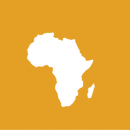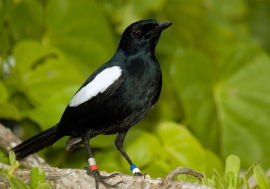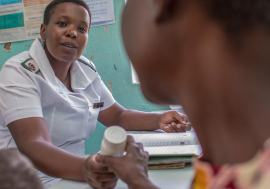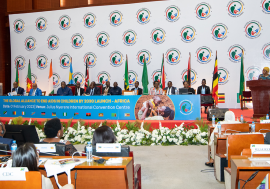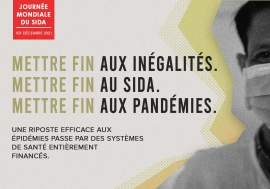AIDS: a 'real weapon of mass destruction'
Late last year, UN Secretary-General spoke to the British Broadcasting Corporation (BBC) about the global struggle against HIV/AIDS. The interview was broadcast on World Service Radio and posted on BBC's website on 28 November. The full interview can be heard at: http://news.bbc.co.uk/2/hi/africa/3244564.stm. The transcribed excerpts below are reproduced with permission of the BBC. They have been edited slightly for clarity.
BBC: I want to start by asking you about the enemy. When did you first realize what a serious enemy you were up against with AIDS?
Annan: I think it was when I discussed the issue with the World Health Organization [WHO] and UNAIDS [the Joint UN Programme on HIV/AIDS] and looked at the figures and the statistics and the devastation it was causing in many African countries, and at the attitude of the leaders. We needed leadership. We needed leadership at all levels. But it was most important to get the presidents and the prime ministers speaking up and that was not happening. I thought we should do whatever we can to raise awareness and to get them involved.

Secretary-General Kofi Annan visiting Matola Health Centre in Mozambique. In the middle is the Secretary-General's Special Envoy for HIV/AIDS in Africa, Stephen Lewis.
Photo: UN / Eskinder Debebe
BBC: Have you been out there on the ground talking to sufferers?
Annan: I've been out there on the ground talking to sufferers.… I've seen the situation in parts of Africa where I've visited AIDS patients in villages, where you see a grandmother and lots of grandchildren but no mother, no father…. I've also lost some very close friends, including people who worked here in the UN, and that also hits you. For me it's not statistics. I've seen the human suffering and the pain.
What is even more difficult is when you see somebody lying there dying who knows that there's medication and medicine somewhere else in the world that can save her, but she can't have it because she's poor and lives in a poor country. Where is our common humanity? How do you explain to her that in certain parts of the world AIDS is a disease that can be treated, that one can live with and function, but in her particular situation it's a death sentence. It's a tough one….
I feel angry, I feel distressed, I feel helpless to live in a world where we have the means, we have the resources, to be able to help all these patients, and what is lacking is the political will. How do you generate that political will to ensure that assistance reaches them? And of course with somebody like myself who tries to speak for the poor and the voiceless, you sort of feel you're failing, you're not getting enough done.
BBC: What more can you do, though?
Annan: I think we should continue our efforts to mobilize the societies to play a role. We should get the leaders to speak out against discrimination, the stigma that is attached to it. We need resources. We need resources to assist these people. We are operating at a relatively low level. We estimate that by 2005 we will need $10 bn worldwide per annum to fight the disease.
BBC: But that money is not forthcoming, is it? The Global Fund [to Fight AIDS, Tuberculosis and Malaria] has been able to hand out $2 bn over two years. You're miles short. Does that make you feel that there's some failure on your part?
Annan: Failure on my part and insensitivity on the part of those with power and the resources — insensitivity on the part of those who should develop the political will to do it…. [We need] to raise the level of contribution to the Global Fund, which has to date given grants to about 93 countries. Wherever I go, they tell me how helpful this has been, and of course they are all looking for additional support. If we do not replenish the funds and the Global Fund were to fail, I think it would be a very serious indictment of the leadership in the world today.
BBC: We talked about what you want from the developed world. Now let's talk about the leadership in those countries faced with epidemics emerging. What's the problem with leadership? Why isn't it coming?
Annan: Some refuse to talk about this because of cultural reasons. We had a situation where one African leader was going to give a speech — I don't want to embarrass him by naming him — and the speech was prepared for him, where he was urged to encourage young people and the population to use condoms to protect themselves. He said, “I can't utter the word condoms, I'm the father of the nation. You can't ask me to encourage the youth to be promiscuous.” But this is saving lives.
BBC: And is that what you said to him?
Annan: Yes…. I spoke to another African leader who was also entirely against the use of condoms and said, “Mr. Secretary-General, we don't want to associate you with the word condoms. You shouldn't even be using that word or speaking about it.” I said, “Mr. President, I've even written to the Pope about it to see how we can work with the Catholic Church on prevention, on education, on treatment and care.” And he looked at me and said, “Mr. Secretary-General, when it comes to condoms, the Pope and I are one.” I said, “Mr. President, but your people are dying. We're talking about saving lives. This is a very serious business — and God will understand.”
BBC: Did you change his mind?
Annan: I didn't. And this is the frustration. These are the painful experiences you sometimes have to go through. And then if I walk away to see one of the dying patients and they were to look up and say, “Help me — get our president and the leaders to help us.” You can't tell them the attitude of their president.
Activists of the AIDS Therapeutic Treatment Now group protest in Durban, South Africa, to demand provision of anti-retroviral drugs.
Photo : © Getty Images / AFP / Rajech Jantilal

BBC: It's very hard, isn't it, because a lot of the groups most affected by AIDS are very marginalized groups anyway…. People who are marginalized can't speak up for themselves. If their governments aren't going to speak up for them, then who is?
Annan: This is the real test. This is why I speak out as often as I can. But I think we need to also get civil society [involved]. NGOs have been very effective partners and they've been active in sometimes embarrassing and pushing the governments to do the right thing.
We've seen women's organizations at the grassroots level, and this is very important because today in Africa, AIDS has a woman's face. Over 50 per cent of the infected are women and often they are the innocent victims. We really need to empower the women to take care of themselves and get the young people involved. And I have seen countries where the campaign is mounted by the head of state and it goes down all the way to the village level.
In Senegal, for example, they are even using griots — a griot is an oral historian — to talk to the people about it. We visited them a couple of years ago and my wife asked this woman griot, “Are you embarrassed to talk about sex and all these things frankly to the people in their village?” She said, “This is death. There is no embarrassment in death. There is no embarrassment in trying to save lives.” And it's that kind of spirit that I want to see in the African leaders and the leaders around the world whose populations are threatened. I want to see them adopt the attitude of this griot…. She was very inspirational.
''I'm talking to people over the heads of their governments. They should take on this fight. They should not be afraid to speak up. They should not be afraid to challenge their governments to do something about the epidemic.''
-- Secretary-General Kofi Annan
BBC: Are you winning the war?
Annan: Well, I would wish to think so, but I'm not. I'm really not winning the war. I'm not winning the war because I don't think the leaders of the world are engaged enough. I also appeal to communities and societies everywhere to become engaged in the struggle. They cannot leave it to their leaders alone.
BBC: So in a way you're talking to the people over the heads of their governments.
Annan: I'm talking to people over the heads of their governments. They should take on this fight. They should not be afraid to speak up. They should not be afraid to challenge their governments to do something about the epidemic. It is their lives. It is the lives of their children, their sisters, their mothers and their brothers and fathers. And they have the right to demand support. They have the right to demand action from leaders whose main and major responsibility, after all, is to ensure the safety and welfare of their people….
I'm also hoping that the world will wake up…. In some of the countries we are talking about, AIDS is the real weapon of mass destruction, and what are we doing about that?
BBC: Some say there was a tragic missed opportunity. That the world was gearing itself up to tackle AIDS. But then on September 11 the twin towers came down, the attack on the Pentagon and the whole world changed. It became the war on terrorism. Is that how you see it?
Annan: Let me put it this way. I hope if we had not had 9/11, many more resources would have gone to AIDS. But I can't be sure. I can't be sure because I have seen other situations where it has not happened
BBC: Three million people, we think, died of AIDS this year — 2 million of them in Africa…. As an African . . . does that feel like injustice?
Annan: It is worse than that. It does feel like injustice, but it also indicates a certain incredible callousness that one would not have expected in the 21st century.
BBC: And how will history judge us for what you describe as this incredible callousness?
Annan: Harshly. Very harshly. And I don't think we will have any defence.

